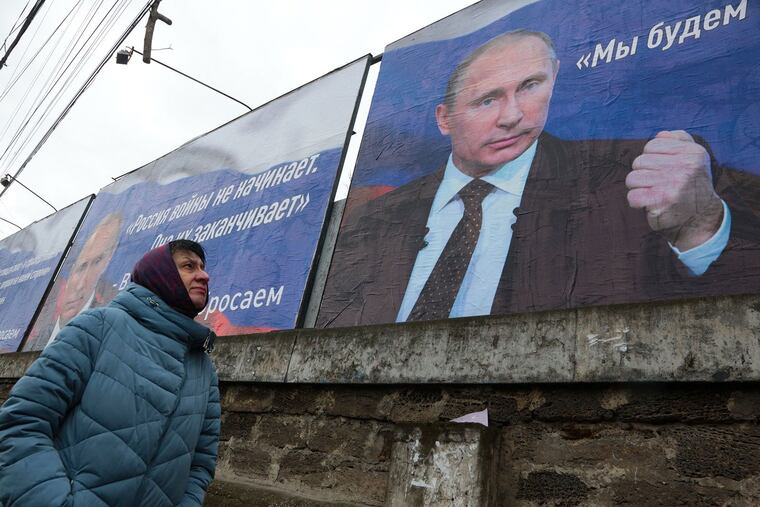Putin and me: He’s living in the past. But so am I. | Opinion
A child of Holocaust survivors, the author has performed extensive research on Nazi atrocities in Ukraine. But unlike the Russian leader, he wants the world to learn from the past, not repeat it.

Russian President Vladimir Putin is obsessed with “denazifying” Ukraine, playing to Russians with long memories of a time eight decades ago when Nazi Germany found eager collaborators in Ukraine. But the current Ukrainian government is neither fascist nor Nazi. The president, Volodymyr Zelensky, is Jewish, and several members of his family were killed during the Holocaust.
As a child of Holocaust survivors who came from what is now western Ukraine, I’m also obsessed with Ukraine. But my obsession is different from Putin’s: I want the world to learn from the violent past, not repeat it.
I grew up without grandparents, and I’ve been trying all my life to understand why. I wrote three cover stories in The Inquirer’s old Sunday magazine about this. After my mother died in 1982, I composed the first English-language account of her 14 months in hiding with nine other Jews in the sewers beneath the German-occupied city of Lviv. Seeking clarity, I visited then-Soviet Ukraine in 1984 with my father, traveled to newly independent Ukraine with my wife in 1992, and returned again five years ago.
» READ MORE: Ukrainians are ready to fight against the new Hitler. His name is Putin. | Trudy Rubin
Each time, I was welcomed warmly and given superb assistance in my search for answers, and in turn, I have proudly helped young Ukrainian journalists and historians to confront their past. Now, as the war rages, my close ties with Ukrainians are rendered more precious by every Russian missile strike. As the path of death and destruction moves westward, threatening Lviv and Rivne, this war becomes more personal for me.
My mother, Halina Wind Preston, the daughter of a poor Hasidic watchmaker in the Carpathian Mountains, had a happy childhood in the town of Turka-nad-Stryjem, Poland (now Turka, Ukraine), where she was born in 1922. After her ordeal in the sewers of Lviv, she was one of the first Holocaust survivors to speak publicly throughout the United States, eventually becoming Delaware’s spokeswoman for the victims and survivors.
My father, George E. Preston, was born Grisza Priszkulnik in 1914 in Rovno, a bustling Jewish cultural hub in what was then Russia and is now Rivne, Ukraine. A French-educated engineer, he survived Auschwitz and Buchenwald, then had a successful career with DuPont in Wilmington. I was 10 years old when he traveled to West Germany to testify at the Auschwitz war crimes trials in Frankfurt.
» READ MORE: Nazis murdered my great-uncle in a forgotten massacre. Decades later, the few memories are fading. | Opinion
My obsession with Ukraine has taught me that honoring the memory of the Jews was not a priority until Westerners like me prompted a new generation of Ukrainians to begin asking questions. It led me in 1992 to film a farmer in a field outside Turka describing a massacre by Germans and Ukrainians of 880 Jewish men, women, and children, which he witnessed as a 16-year-old boy on Jan. 8, 1942.
My obsession led me to travel with my father in 1984 to the location of the old Jewish cemetery in Rivne, where his mother had been buried before the war. We did not find her. The Soviets had bulldozed the graveyard and put up a playground.
This obsession also led me to go with my father to the woods outside Rivne, to visit the spot where German death squads and local Ukrainian collaborators had shot 23,500 Jewish men, women, and children in three days in November 1941, including my grandfather and uncle. The Soviet Union (which Putin reveres) had done nothing to mark the site as a location of mass murder of Jews in Ukraine, and once inside the rusted gates, we found bones and teeth. By contrast, an impressive memorial stands there today, erected by the Ukrainian city council.
“If we truly want to ‘denazify’ Ukraine, we do it by digging into the past, not by bombing it.”
Last year, I shared my 1992 Turka footage with a team of young Ukrainian historians who had requested my guidance for a film about what happened to the Jews of Turka. On Jan. 27 of this year, International Holocaust Remembrance Day, they released their excellent documentary, Wordless, in Ukrainian with English subtitles, including sections of my interview with the farmer in the field and additional footage from my 1992 trip.
If we truly want to “denazify” Ukraine, we do it by digging into the past, not by bombing it. The erasure of the Jews from the collective memory of Ukraine can be undone only by learning from history, facing it truthfully, and finding a healthy and peaceful way forward.
David Lee Preston spent four decades as a reporter, columnist, and editor at The Inquirer and the Daily News. Learn more about his research at DavidLeePreston.com. A version of this article appeared on Grid.news.